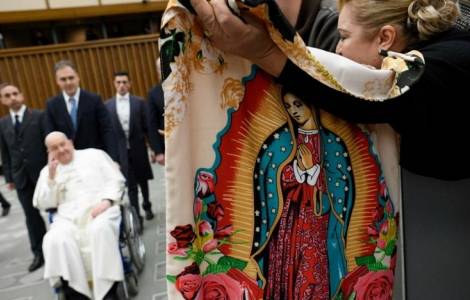
Vatican Media
Vatican City (Agenzia Fides) - Memory, mercy, promise: these are the three key words for those who, like the Virgin Mary, recognize the action of God the Father in the history of humanity, said Pope Francis during today's general audience in the Paul VI Hall.
The Pope, who had a cold, did not read the text of the catechesis himself: "I apologize," explained Pope Francis, "because with this severe cold it is difficult for me to speak." A member of the Secretariat of State read the address for the Pope, which dealt with the themes "Blessed is she who believed," the Visitation and the Magnificat.
When the Virgin Mary visits Saint Elizabeth, the Bishop of Rome said, "it is above all Jesus who visits his people in the womb of his mother... Mary sets out, she does not choose to protect herself from the world, she does not fear danger or the judgment of others, but goes out to meet people." Because "when you feel loved, you experience a strength that carries love forward. As the Apostle Paul says, 'the love of Christ compels us' (2 Cor 5:14), it pushes us, it moves us."
The meeting of the two women, Mary and Elizabeth, "has an astonishing effect: the voice of the 'full of grace' who greets Elizabeth provokes a prophetic movement in the child in her womb and causes Elizabeth to pronounce a double blessing ("Blessed are you among women, and blessed is the fruit of your womb"). And a beatitude ("Blessed is she who believed that what the Lord had spoken to her would be fulfilled"). "In the face of the recognition of the messianic identity of her Son and her own vocation as a mother, Mary does not speak of herself but of God. She raises a hymn full of faith, hope and joy, a song that resounds daily in the evening prayer of the Church: the Magnificat," said the Pope.
This praise "is permeated with biblical echoes, a sign that Mary does not want to 'fall out of line' but rather to harmonize with the Fathers and to praise God's mercy for the humble." The strong presence of the Easter motif makes the Magnificat "also a song of redemption. The verbs are all in the past," explained the Pope, because they are "permeated by a loving memory that fills the present with faith and illuminates the future with hope: Mary sings of the grace of the past, but she is also the woman of the present who carries the future in her womb."
And while the first part of the canticle “praises the action of God in Mary, who, as a microcosm of the people of God, follows the covenant perfectly”, the second part expands “to the work of the Father in the macrocosm of the history of his children” and “unfolds around three key concepts: memory – mercy – promise”.
God has indeed “saved his people, beginning with the Exodus, and has let a continuous stream of merciful love flow over his covenant people ‘from generation to generation’, and now reveals the fullness of salvation in his Son, whom he sent to redeem his people from their sins. From Abraham to Jesus Christ and to the community of believers, Easter appears as the key hermeneutical dimension to understand each subsequent liberation, up to that accomplished by the Messiah in the fullness of time”, the Pope concluded.
Only at the end of the audience, during the greetings in Italian, did the Pope take the floor again to repeat the appeal for peace in the clearest possible terms: "Let us think of the countries where war is raging: the tormented Ukraine, Israel, Sudan, so many countries that are suffering there. Let us think of the displaced people in Palestine and let us pray for them," said the Pope. Shortly before, in the greetings in Polish, Don Giroli read another prayer intention of the Pope for peace: "I encourage you to pray for the priests and consecrated men and women who carry out their ministry in poor and war-torn countries, especially in Ukraine, the Middle East and the Democratic Republic of Congo. For many, this presence is proof that God is thinking of them." (F.B.) (Agenzia Fides, 5/2/2025)